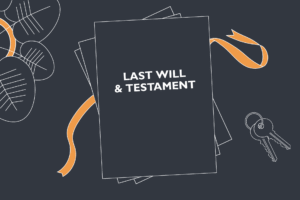Inheritance often creates emotional challenges, and the legal side can feel even trickier. If you’ve inherited a property from a loved one, you might assume it stays protected and ring-fenced from future claims. But relationships, especially long-term partnerships and marriages, complicate matters. A partner can claim a share of your inherited home if the relationship ends, particularly when you both lived in the property, invested in improvements, or merged finances. With property inheritance and Capital Gains Tax reform back in political debate, now is the time to understand both your rights and your risks.

When an Inherited Home Becomes a Shared Asset: A Real-Life Example
Take the case of a homeowner in Kent, who posted this query online:
“I inherited my parents’ home and my partner moved in with me back in 2009. There is no mortgage on the house. I had his name put on the deeds of the house but we are not married. He pays me rent and has paid towards things that have been carried out on the house. What would he be entitled to if we split up?”
At first glance, the arrangement might look secure, the owner inherited the home and kept the primary role. But once she added her partner’s name to the title deeds and lived with him for over a decade while sharing finances, the property stopped being solely her inheritance. Married or not, when you jointly own or treat a property as shared, the law can classify it as matrimonial property (or a beneficial joint interest). In a separation, the other party can then pursue a legal or equitable claim, even if they never contributed to the original inheritance.
Does Inheritance Stay Protected in a Divorce?
In legal terms, inherited assets such as property or money are usually considered non-matrimonial assets. That means they are not automatically divided in the same way as joint bank accounts or family homes bought together.
However, this doesn’t mean your inherited property is always safe. If:
- You lived in the home together
- You added your partner’s name to the deeds
- You used the home as the marital residence
- You funded renovations or bills together
- You merged finances or mortgage payments
Then the property can be considered to have become part of the “matrimonial pot” – and subject to division upon divorce or dispute. This is particularly true when the courts determine that the value of the inherited asset is needed to meet either party’s reasonable financial needs, especially where children are involved.
What If You’re Not Married?
Contrary to popular belief, there’s no such thing as a “common law marriage” in the UK. Cohabiting couples do not have automatic legal rights over one another’s property. But this doesn’t mean your partner has no claim.

If your partner:
- Contributed significantly to mortgage repayments, renovations, or bills
- Was promised a share of the property
- Was added to the title deeds
- Can demonstrate they had a reasonable expectation of ownership
Then they may be able to bring a claim under Trusts of Land and Appointment of Trustees Act 1996 (TOLATA) – which allows courts to resolve property ownership disputes between unmarried couples. In these cases, the courts look at the intention behind financial decisions and the reality of shared life – not just who signed the cheque.
Will the Inheritance Be Split 50-50?
Not necessarily. The UK courts operate under the principle of fairness, not automatic equal division, particularly with inheritance. Under the Matrimonial Causes Act 1973, courts have the discretion to decide what’s fair depending on:
- The length of the relationship
- Whether children are involved
- The financial needs of both parties
- The lifestyle enjoyed during the relationship
- Any health issues or future earning capacity
- How the property has been used and improved
In the 2011 case Y v Y, a husband inherited a substantial estate from his family, which had been used to fund the couple’s lifestyle during their 26-year marriage. Despite the property originating from one side, the court awarded the wife 32.5% of the inherited assets – because it was deemed necessary to meet her and the children’s needs.
Is Future Inheritance at Risk Too?
Courts generally exclude future inheritance from divorce settlements, especially when it’s speculative or depends on a living parent. However, without a financial settlement or consent order in place before you finalise the divorce, your ex can still pursue a claim on that inheritance later. That’s why you must secure a financial order, even in amicable splits. If you don’t, your ex may bring claims years after the divorce ends.

How to Protect Your Inherited Property
If you’ve inherited a home, or expect to, and want to protect it for your children or your own future, act on these options:
1. Create a Prenuptial or Postnuptial Agreement
Use these legal documents to keep your inheritance separate and prevent it from becoming matrimonial property in a divorce.
2. Keep Finances Separate
Avoid adding your partner to the deeds or using joint accounts for property improvements unless you plan to share the home. Keeping the asset separate makes it easier to prove it belongs solely to you.
3. Set Up a Trust
Placing inherited property into a trust for your children can preserve its value and shield it from claims.
4. Get Legal Advice Early
If a partner moves in or you’ve added them to the deeds, consult a solicitor promptly to understand your exposure and options.
The Inheritance Tax and Capital Gains Tax Context
At the time of writing, the government is reviewing the Capital Gains Tax (CGT) regime – including how it applies to inherited property. While the focus is primarily on thresholds and timelines for CGT liability, the ripple effects may influence how inherited property is treated if sold after separation. It’s important to consult both legal and tax professionals to fully understand how changing policy could impact your individual situation – particularly if you plan to retain or transfer property post-breakup.
Final Thoughts: Inheritance Isn’t Automatically Safe
Many people believe an inherited home stays untouchable in a divorce or breakup but that’s a myth. The law offers some protections, but how you use, share, and manage the property directly shapes its legal status. For many homeowners, a property carries both deep emotional ties and generational wealth. Whether you’ve already inherited a family home or expect to in the future, you need to protect it through proactive planning not by reacting later.
Contact us:
mark@daviesdavies.co.uk – Sales Director (contact for sales, lettings and new homes)
katrina@daviesdavies.co.uk – Director of Property & Block Management (contact for property and block management)
Davies & Davies Estate Agents, 85 Stroud Green Road, London, N4 3EG
Article & images by Barefaced Studios
You might also want to read other useful blog articles by clicking here.
Please note that all content contained within our website is for informational purposes only. You should not construe any such information or other material as legal, tax, investment, financial, or other advice. All Content on this site is information of a general nature and does not address the circumstances of any particular individual or entity. We advise seeking professional advice from a legal, financial, or other professional.

For most first-time buyers, the focus naturally falls on two big numbers: the deposit and the mortgage. But once your offer is accepted, a range of additional costs begin to appear – some expected, others less obvious. Understanding these early can make the difference between a smooth purchase and a stressful financial stretch. Our guide breaks down the full picture, helping you plan for the real cost of buying a home in the UK.
Read More...
For many homeowners, the end of a fixed-rate mortgage deal arrives quietly, often marked by a letter from the lender and the realisation that monthly payments may soon increase. Remortgaging is simply the process of switching your existing mortgage to a new deal, either with your current lender or a different one, but the decisions involved can feel complex, particularly if it’s your first time navigating the process. Understanding how remortgaging works, when it makes sense, and how it fits into wider plans such as moving or releasing equity can help you approach the decision with confidence.
Read More...
One of the most common questions we’re asked by homeowners in North London is whether there’s a “best” time of year to put a property on the market. The short answer is: there are stronger and quieter months – but the right timing always depends on your circumstances and your local market. Understanding how buyer behaviour changes throughout the year can help you choose the moment that gives your property the best chance of attracting interest, securing viewings and achieving a successful sale.
Read More...Get in Touch
Opening Times
Mon – Thurs: 0900 – 1815
Fri: 0900 – 1800
Sat: 1000 – 1600
Sun: Appointments by request